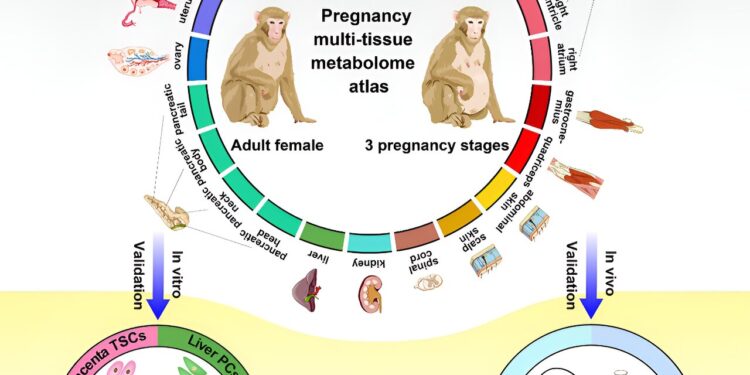Credit: Cell (2024). DOI: 10.1016/j.cell.2023.11.043
A large team of obstetrician-gynecologists, regenerative medicine and fetal development specialists, and metabolism researchers in China tested macaques and mapped many of the changes that occur in metabolic pathways in primates during pregnancy.
In their project, reported in CellThe group studied changes in metabolic pathways in macaques by comparing metabolite samples from organs of non-pregnant females with those at different stages of pregnancy.
Previous research has shown that primate organs “communicate” with each other using metabolic pathways. Such communications involve sending metabolites – a type of molecular nutrient – from one organ to another. Such a communication system is necessary to maintain a balanced overall metabolic system.
In this new study, the research team wondered what changes, if any, occurred in the metabolic system during pregnancy in primates. To find out, they turned to macaques, a primate with a reproductive system similar to that of humans.
The research team collected macaque metabolite samples from multiple organs at different stages of pregnancy and compared them to a control group of non-pregnant females.
Researchers have discovered many differences during the early stages of pregnancy, including reduced communications between the uterus and the heart and certain types of muscles. Another reason was that once formed, the placenta joined the metabolic system sending metabolites to the ovaries, liver and heart, even as the uterus sent metabolites to the scalp. The research team also noted that during the later stages of pregnancy, skeletal muscles begin to exchange metabolites with the spine.
Another part of the research effort involved collecting and studying blood samples from pregnant women. Researchers found that women with preeclampsia experienced a significant drop in production of the metabolite corticosterone, which they believe could help explain the associated inflammation. They also found that changes in levels of palmitoylcarnitine, also a metabolite, could be a factor in the development of gestational diabetes.
More information:
Dainan Yu et al, An atlas of the multitissue metabolome of primate pregnancy, Cell (2024). DOI: 10.1016/j.cell.2023.11.043
Cell
© 2024 Science X Network
Quote: Mapping changes in metabolic pathways during pregnancy (February 6, 2024) retrieved February 6, 2024 from
This document is subject to copyright. Apart from fair use for private study or research purposes, no part may be reproduced without written permission. The content is provided for information only.



